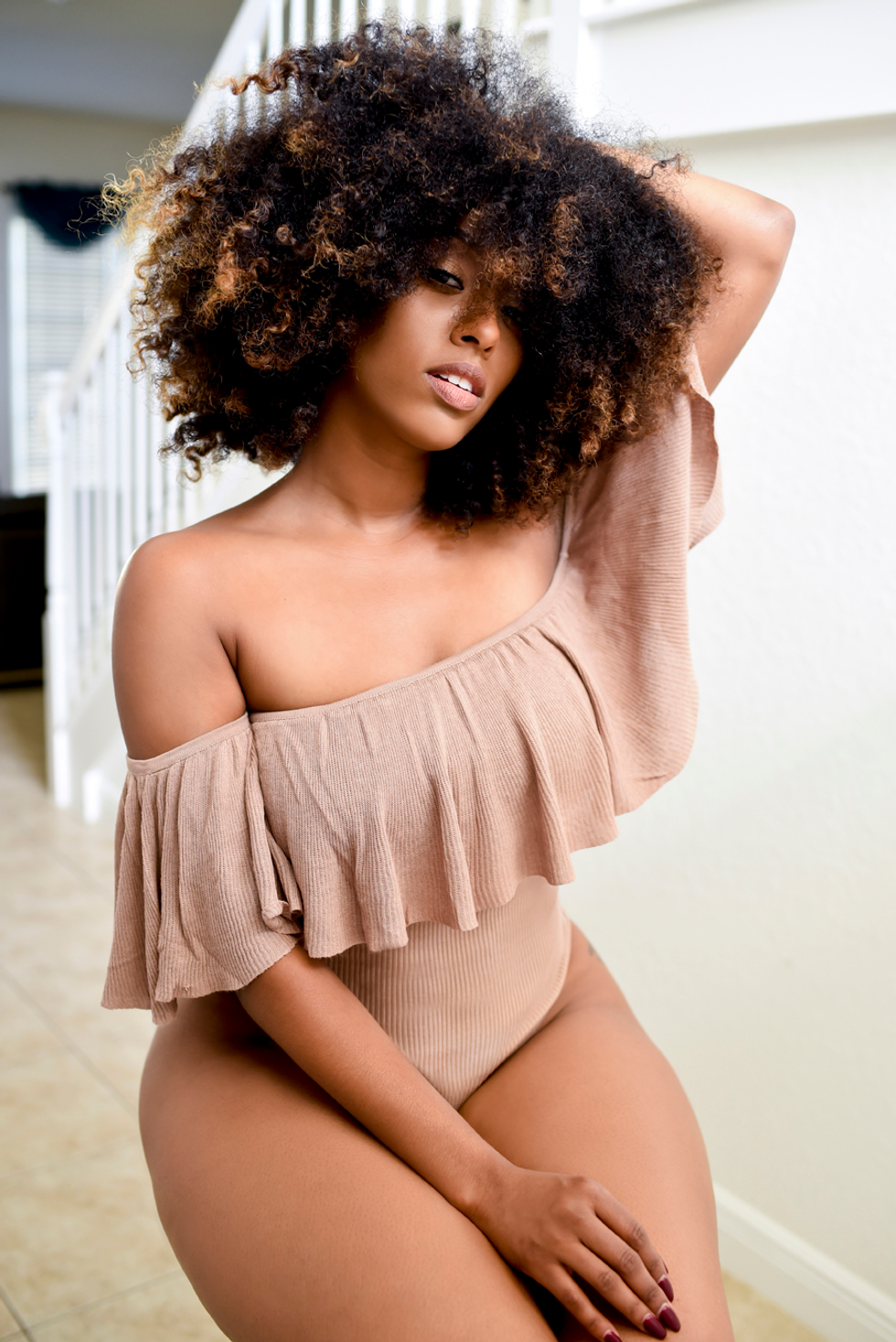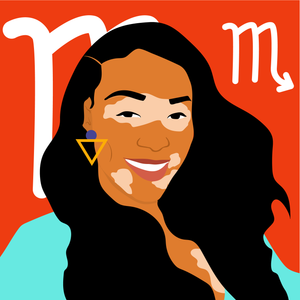
The relationship we have and nurture with self lays the foundation for how we relate to and connect with others in our lives. Assessing the issues that discourage self-love from prospering are key in order to repair and reignite the freedom that comes when we finally believe the words "you are enough." I chatted with self-love advocate and lifestyle entrepreneur Shelah Marie – who you may remember from when her 2017 photo of doing yoga with boyfriend, rapper Ace Hood, went viral. Shelah's mission is to create a movement of total self-love and liberation for women of color through her platform Curvy, Curly, Conscious – a place where "self-help" meets "real talk" through virtual and offline events and retreats.
Shelah opens up about her healing journey and gives tips for others repairing one of most important relationships a woman will ever have: The one she has with herself.
To fully understand how self-love evolves over time, we must start at the beginning – childhood. "I grew up as the only person of color growing in my home..the only Black person in my neighborhood. I was the only one with hair like mine, skin like mine. I couldn't figure out why I was different. My [immediate] family wasn't open to talking about it."
"Because I had fundamentally saw the world through race at a young age...what I saw was a big deal. Everyone didn't look the same and it mattered. I learned to deconstruct the performance of race around me...I was aware of people's emotions and saw things that people weren't saying. I always wanted to create something that I never saw."
Acting, the performance of characters, and storytelling became a passion of Shelah's. Her 2010 move to New York City to enroll in a Master's program at the prestigious Tisch School of the Arts would be the domino that set off a chain of important events in her life. "My experience in New York changed who I was. I learned a lot about other cultures, languages, and how to appreciate the small things. I couldn't afford TV or cable or a car. I didn't have disposable income. I learned to exist on very little. I put everything into my craft."
A Journey Into Self-Love & Self-Healing

Photo Credit: Latoya Osborne
Courtesy of Shelah Marie
From juggling multiple jobs to dealing with seeing her friends "making it", Shelah became severely depressed and her anxiety peaked. "I was always surrounded by people, but I was always alone in my mind. My self-esteem was so low and I started to attract people that reflected that. I attracted men that were treating me in an unhealthy way. One relationship got extremely abusive."
An argument turned into Shelah's then-partner telling her, in front of her roommates, "Yeah, bitch. You're a bitch and I hope I'm the first person to ever call you that, bitch."
Enough was enough.
"I saw myself as a child and I realized the only other person to call me a bitch in front of people was my mom. This is where my spiritual journey kicked up a notch. I told myself that I get it. Whatever pain and hurt that is within me that feels the need to manifest this man to reflect my beliefs at me this strongly...this will never happen again. I will never be at this place again. Whatever I have to do to heal it, I will do. From then on, I put myself through Shelah's school of self."
Shelah recognized that in order to reach her potential, she would have to learn to navigate past the toxicity in her life. Over the next few years, self-healing became her priority. Four important things led the way for Shelah's transformation: Talk therapy, working with a healer, reading, and meditation. This work allowed Shelah to confront the trauma that was hiding in her subconscious. She was committed to equipping herself with the information so she could start to understand what she had been through in life.
Meditation was especially helpful as it allowed her to "get friendly" with herself. "I realized I was an adult and didn't know myself and have never sat with myself. I'd used men, career, work to distract me."
The reality of sitting in and embracing pain is something that many women of color often accept as a part of life, Shelah believes. "'I'ma talk to Jesus. I'ma go to church. I'm going to pray about it...get a new outfit, you'll be fine.' This is what we tell each other. It doesn't work. Black women are comfortable with sharing their pain just from a place of 'This is just how it is.' When I used to listen to a lot of Gospel, I would become addicted to how much pain I would feel. Sometimes we can get addicted to that space of talking about the pain, living in the pain, and being in the pain. That space is part of the process but I'm more interested in moving beyond that."

Photo Credit: Latoya Osborne
Courtesy of Shelah Marie
"Whatever pain and hurt that is within me that feels the need to manifest this man to reflect my beliefs at me this strongly...this will never happen again. I will never be at this place again. Whatever I have to do to heal it, I will do."
How Meditation & Self-Healing Led Her To True Love
Shelah's call for Black women? Listen to yourself. Honor your pain. Allow yourself to heal. Allow yourself to be connected and feel supported from within.
If you're starting out on the journey, Shelah recommends finding a therapist that caters to your needs, listening to guided meditations like The Meditation Mixtape by Shelah Marie, and filling yourself with knowledge. The books that aided her include A Return To Love by Marianne Williamson, Codependent No More by Melody Beattie, Radical Forgiveness by Colin Tipping, and The Four Agreements by Don Miguel Ruiz.
If she really wanted to focus on healing, Shelah knew that she'd have to be radical in how she invested in her learning and the expectations she set for those she surrounded herself with. "My healing was my job, and it still is. Everyone in my [tribe] knows this. Anyone I can keep around...if they are not actively healing, they will be phased out of [my life.]"
Shelah's healing journey allowed her to embrace the unknown when it unexpectedly appeared. She was new to loving herself and having standards in a relationship, when she met her now-husband Ace Hood, a few years ago in New York City. Upon first meeting him after an invite to a New York club during All-Star Weekend, Shelah knew there was something special.
"He was in the back. There were all these women and celebrities around him. [Ace] saw me and parted the divider and went, 'Shelah, hi! I love your videos on Instagram and you're so funny.' He had this big smile and his eyes lit up. I said to myself, 'I'm fucked. If I'm not supposed to go for it, I'm going for it. I don't care what happens.'"
As with any relationship, it didn't come without challenges – especially in the beginning. Though Ace was attracted to her personality and who she was – the two had to learn to coexist and understand their two very different worlds.
"I struggled for a while trying to fit a circle in a square peg and tried to make myself into what I thought a rapper's girlfriend should be. That didn't last long. [I had to understand that] this is who I am. I'm Shelah. This is me."
Though people had questions about how their relationship would work, Shelah emphasized the notion that you can redefine yourself and humans are layered individuals. When Ace became interested in learning more about the benefits of yoga, the two decided to go on a journey together. She saw something in Ace and knew that they could help each other become the best versions of themselves.
Even if you're not in a relationship and find yourself longing for companionship from a partner, Shelah reminds us not to wallow in self-pity. "When I was in NY [before meeting Ace], I was single and depressed. I had to be proactive about the feelings I wanted [and] I'd fuse that into my meditations. Do not leave it in the hands of someone else to provide you with what you need. Date yourself. Do nice things. Look good for yourself! Sometimes I'd get sad [or jealous], but I'd remind myself, 'Man, I feel so supported. I feel so loved.'"

Photo Credit: Latoya Osborne
Courtesy of Shelah Marie
"I had to be proactive about the feelings I wanted [and] I'd fuse that into my meditations. Do not leave it in the hands of someone else to provide you with what you need."
A Call To Black Women & Their Healing
Helping other women of color heal has been the core of Shelah's personal mission and her recent entrepreneurial pursuits as well. She mentions, "As that little Shelah [experienced], I wanted to create something that I never saw. With Curvy, Curly, Conscious, I was responding to what was being given to me. My Instagram started to grow. I did an event, it was a success. Four-city tour, success. Black women believed in me. I needed to keep giving them more. I wanted to produce high-quality, high-level beautiful experiences for Black women to heal and commune with each other because I believe we deserve it. Black women deserve beauty. It reaffirms our humanity."
However, Shelah again found herself having to confront deep fears and insecurities that would have stunted her ability to deliver on her promise.
"The biggest challenges as an entrepreneur have been overcoming all of my individual fears. You know how much courage it takes to take people's hard-earned money in advance for something? You have to deliver. I wasn't a business person. My background was in acting. I had to invite people in [such as bookkeepers to help me.] I had to [overcome] my own fears about not being good enough and not knowing enough."
For others looking to build a brand in the self-help space, Shelah notes that investigating your personal strength is a must.
"What skills do you have that everyone goes, 'How do you do that?' A lot of people try to copy and emulate. The reason my account grew was because my strong suit is sharing my story and talking. You don't have to have a big following to have a big business. Find your zone of genius and follow that. Just because social media is poppin, doesn't mean everyone has to have a page that's popping. Follow what you're good at."
When remembering where this journey all started, Shelah had some words she'd tell her younger self, the little girl struggling to figure out her story. "You're doing great. You're doing really well. It's fine."
For those of us also navigating the fluid waters of nurturing self-love, Shelah says, "We live in a society that is extremely driven. There's a little window into everyone else's life now. There's Instagram and Facebook. Sometimes it looks like everyone is moving at 100mph and you're just moving slow. Don't watch what everyone else is doing. You are doing fine, too."
Our self-love journeys are not monolithic, but one thing is true for us all: Growth is possible.
For more of Shelah, follow her on Instagram.
Featured image by Latoya Osborne
Originally published on February 13, 2019
- Best Books Podcasts Focused On Healing - xoNecole: Women's Interest, Love, Wellness, Beauty ›
- Steps to Healing From Childhood Trauma - xoNecole: Women's Interest, Love, Wellness, Beauty ›
- Ace Hood & Shelah Marie's Wedding Was Everything! - xoNecole: Lifestyle, Culture, Love, Wellness ›
- Shelah Marie: Curvy, Curly, Conscious - YouTube ›
- The Many Forms of Healing: Bare Retreat 2018 — Black Girl In Om ›
- #SelfLove ›
- Self-Love Panel Discussion with BooHoo in Hollywood — Healthy is ... ›
- 79 | Good Vibe Tribe: Self Mastery & Soul Talks with Shelah Marie ... ›
- Press/Media — the shelah marie ›
- Shelah Marie Talks Curvy, Curly, Conscious Movement & Self ... ›
- 'Curvy, Curly, Conscious' Provides Empowerment and Healing at ... ›
- Curvy, Curly, Conscious ›
- 10 Steps to Self-Love (online course with Shelah Marie) ›
Because We Are Still IT, Girl: It Girl 100 Returns
Last year, when our xoNecole team dropped our inaugural It Girl 100 honoree list, the world felt, ahem, a bit brighter.
It was March 2024, and we still had a Black woman as the Vice President of the United States. DEI rollbacks weren’t being tossed around like confetti. And more than 300,000 Black women were still gainfully employed in the workforce.
Though that was just nineteen months ago, things were different. Perhaps the world then felt more receptive to our light as Black women.
At the time, we launched It Girl 100 to spotlight the huge motion we were making as dope, GenZennial Black women leaving our mark on culture. The girls were on the rise, flourishing, drinking their water, minding their business, leading companies, and learning to do it all softly, in rest. We wanted to celebrate that momentum—because we love that for us.
So, we handpicked one hundred It Girls who embody that palpable It Factor moving through us as young Black women, the kind of motion lighting up the world both IRL and across the internet.
It Girl 100 became xoNecole’s most successful program, with the hashtag organically reaching more than forty million impressions on Instagram in just twenty-four hours. Yes, it caught on like wildfire because we celebrated some of the most brilliant and influential GenZennial women of color setting trends and shaping culture. But more than that, it resonated because the women we celebrated felt seen.
Many were already known in their industries for keeping this generation fly and lit, but rarely received recognition or flowers. It Girl 100 became a safe space to be uplifted, and for us as Black women to bask in what felt like an era of our brilliance, beauty, and boundless influence on full display.
And then, almost overnight, it was as if the rug was pulled from under us as Black women, as the It Girls of the world.
Our much-needed, much-deserved season of ease and soft living quickly metamorphosed into a time of self-preservation and survival. Our motion and economic progression seemed strategically slowed, our light under siege.
The air feels heavier now. The headlines colder. Our Black girl magic is being picked apart and politicized for simply existing.
With that climate shift, as we prepare to launch our second annual It Girl 100 honoree list, our team has had to dig deep on the purpose and intention behind this year’s list. Knowing the spirit of It Girl 100 is about motion, sauce, strides, and progression, how do we celebrate amid uncertainty and collective grief when the juice feels like it is being squeezed out of us?
As we wrestled with that question, we were reminded that this tension isn’t new. Black women have always had to find joy in the midst of struggle, to create light even in the darkest corners. We have carried the weight of scrutiny for generations, expected to be strong, to serve, to smile through the sting. But this moment feels different. It feels deeply personal.
We are living at the intersection of liberation and backlash. We are learning to take off our capes, to say no when we are tired, to embrace softness without apology.
And somehow, the world has found new ways to punish us for it.

In lifestyle, women like Kayla Nicole and Ayesha Curry have been ridiculed for daring to choose themselves. Tracee Ellis Ross was labeled bitter for speaking her truth about love. Meghan Markle, still, cannot breathe without critique.
In politics, Kamala Harris, Letitia James, and Jasmine Crockett are dragged through the mud for standing tall in rooms not built for them.
In sports, Angel Reese, Coco Gauff, and Taylor Townsend have been reminded that even excellence will not shield you from racism or judgment.

In business, visionaries like Diarrha N’Diaye-Mbaye and Melissa Butler are fighting to keep their dreams alive in an economy that too often forgets us first.
Even our icons, Beyoncé, Serena, and SZA, have faced criticism simply for evolving beyond the boxes society tried to keep them in.
From everyday women to cultural phenoms, the pattern is the same. Our light is being tested.

And yet, somehow, through it all, we are still showing up as that girl, and that deserves to be celebrated.
Because while the world debates our worth, we keep raising our value. And that proof is all around us.
This year alone, Naomi Osaka returned from motherhood and mental health challenges to reach the semifinals of the US Open. A’ja Wilson claimed another MVP, reminding us that beauty and dominance can coexist. Brandy and Monica are snatching our edges on tour. Kahlana Barfield Brown sold out her new line in the face of a retailer that had been canceled. And Melissa Butler’s company, The Lip Bar, is projecting a forty percent surge in sales.

We are no longer defining strength by how much pain we can endure. We are defining it by the unbreakable light we continue to radiate.
We are the women walking our daily steps and also continuing to run solid businesses. We are growing in love, taking solo trips, laughing until it hurts, raising babies and ideas, drinking our green juice, and praying our peace back into existence.
We are rediscovering the joy of rest and realizing that softness is not weakness, it is strategy.
And through it all, we continue to lift one another. Emma Grede is creating seats at the table. Valeisha Butterfield has started a fund for jobless Black women. Arian Simone is leading in media with fearless conviction. We are pouring into each other in ways the world rarely sees but always feels.

So yes, we are in the midst of societal warfare. Yes, we are being tested. Yes, we are facing economic strain, political targeting, and public scrutiny. But even war cannot dim a light that is divinely ours.
And we are still shining.
And we are still softening.
And we are still creating.
And we are still It.

That is the quiet magic of Black womanhood, our ability to hold both truth and triumph in the same breath, to say yes, and to life’s contradictions.
It is no coincidence that this year, as SheaMoisture embraces the message “Yes, And,” they stand beside us as partners in celebrating this class of It Girls. Because that phrase, those two simple words, capture the very essence of this moment.
Yes, we are tired. And we are still rising.
Yes, we are questioned. And we are the answer.
Yes, we are bruised. And we are still beautiful.

This year’s It Girl 100 is more than a list. It is a love letter to every Black woman who dares to live out loud in a world that would rather she whisper. This year’s class is living proof of “Yes, And,” women who are finding ways to thrive and to heal, to build and to rest, to lead and to love, all at once.
It is proof that our joy is not naive, our success not accidental. It is the reminder that our light has never needed permission.
So without further ado, we celebrate the It Girl 100 Class of 2025–2026.
We celebrate the millions of us who keep doing it with grace, grit, and glory.
Because despite it all, we still shine.
Because we are still her.
Because we are still IT, girl.
Meet all 100 women shaping culture in the It Girl 100 Class of 2025. View the complete list of honorees here.
Featured image by xoStaff
Exclusive: Viral It Girl Kayla Nicole Is Reclaiming The Mic—And The Narrative
It’s nice to have a podcast when you’re constantly trending online. One week after setting timelines ablaze on Halloween, Kayla Nicole released an episode of her Dear Media pop culture podcast, The Pre-Game, where she took listeners behind the scenes of her viral costume.
The 34-year-old had been torn between dressing up as Beyoncé or Toni Braxton, she says in the episode. She couldn’t decide which version of Bey she’d be, though. Two days before the holiday, she locked in her choice, filming a short recreation of Braxton’s “He Wasn’t Man Enough for Me” music video that has since garnered nearly 6.5M views on TikTok.
Kayla Nicole says she wore a dress that was once worn by Braxton herself for the Halloween costume. “It’s not a secret Toni is more on the petite side. I’m obsessed with all 5’2” of her,” she tells xoNecole via email. “But I’m 5’10'' and not missing any meals, honey, so to my surprise, when I got the dress and it actually fit, I knew it was destiny.”
The episode was the perfect way for the multihyphenate to take control of her own narrative. By addressing the viral moment on her own platform, she was able to stir the conversation and keep the focus on her adoration for Braxton, an artist she says she grew up listening to and who still makes her most-played playlist every year. Elsewhere, she likely would’ve received questions about whether or not the costume was a subliminal aimed at her ex-boyfriend and his pop star fiancée. “I think that people will try to project their own narratives, right?” she said, hinting at this in the episode. “But, for me personally – I think it’s very important to say this in this moment – I’m not in the business of tearing other women down. I’m in the business of celebrating them.”
Kayla Nicole is among xoNecole’s It Girl 100 Class of 2025, powered by SheaMoisture, recognized in the Viral Voices category for her work in media and the trends she sets on our timelines, all while prioritizing her own mental and physical health. As she puts it: “Yes, I’m curating conversations on my podcast The Pre-Game, and cultivating community with my wellness brand Tribe Therepē.”
Despite being the frequent topic of conversation online, Kayla Nicole says she’s learning to take advantage of her growing social media platform without becoming consumed by it. “I refuse to let the internet consume me. It’s supposed to be a resource and tool for connection, so if it becomes anything beyond that I will log out,” she says.
On The Pre-Game, which launched earlier this year, she has positioned herself as listeners “homegirl.” “There’s definitely a delicate dance between being genuine and oversharing, and I’ve had to learn that the hard way. Now I share from a place of reflection, not reaction,” she says. “If it can help someone feel seen or less alone, I’ll talk about it within reason. But I’ve certainly learned to protect parts of my life that I cherish most. I share what serves connection but doesn’t cost me peace.
"I refuse to let the internet consume me. It’s supposed to be a resource and tool for connection, so if it becomes anything beyond that I will log out."

Credit: Malcolm Roberson
Throughout each episode, she sips a cocktail and addresses trending topics (even when they involve herself). It’s a platform the Pepperdine University alumnus has been preparing to have since she graduated with a degree in broadcast journalism, with a concentration in political science.
“I just knew I was going to end up on a local news network at the head anchor table, breaking high speed chases, and tossing it to the weather girl,” she says. Instead, she ended up working as an assistant at TMZ before covering sports as a freelance reporter. (She’s said she didn’t work for ESPN, despite previous reports saying otherwise.) The Pre-Game combines her love for pop culture and sports in a way that once felt inaccessible to her in traditional media.
She’s not just a podcaster, though. When she’s not behind the mic, taking acting classes or making her New York Fashion Week debut, Kayla Nicole is also busy elevating her wellness brand Tribe Therepē, where she shares her workouts and the workout equipment that helps her look chic while staying fit. She says the brand will add apparel to its line up in early 2026.
“Tribe Therepē has evolved into exactly what I have always envisioned. A community of women who care about being fit not just for the aesthetic, but for their mental and emotional well-being too. It’s grounded. It’s feminine. It’s strong,” she says. “And honestly, it's a reflection of where I am in my life right now. I feel so damn good - mentally, emotionally, and physically. And I am grateful to be in a space where I can pour that love and light back into the community that continues to pour into me.”
Tap into the full It Girl 100 Class of 2025 and meet all the women changing game this year and beyond. See the full list here.
Featured image by Malcolm Roberson









